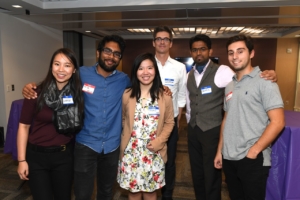
NYU Stern students at the 2016 Social Impact Student Alumni Mingle with Matt Statler, Richman family director of business ethics and social impact programming for Stern’s undergraduate college. Courtesy photo
Social impact. Ethics. Sustainability. At more and more business schools, these have become part of the curriculum, not just feel-good platitudes of the moment. Now, amid post-election debate over climate change and whether the United States should remain in the Paris Climate Agreement, a new effort at New York University’s Stern School of Business is particularly timely.
Stern established a new co-concentration in sustainable business last fall. A co-concentration is not a core business discipline, so students must declare another concentration as well — finance, for example, or marketing, accounting, or management — that the co-concentration supplements. Some of the Stern classes will be taught by Tensie Whelan, former president of the Rainforest Alliance, who founded the school’s Center for Sustainable Business in 2016.
“Over the years, we started realizing that there was an increased interest, both from the students and from companies outside,” says Rohit Deo, acting dean. “And the interest was in not just improving the bottom-line profit, but in looking at how it impacts society and the environment. We have this long tradition of teaching ethics, so this semester we decided to formalize it by launching this.”
BUSINESS THROUGH THE LENSE OF IMPACT
Other undergraduate business programs have also seen rise in student interest in sustainability and social enterprise in recent years. At the University of Massachusetts’ Isenberg School of Management, students may now complete a five-course certificate program in Sustainable Business Practices. Pennsylvania State’s Smeal College of Business offers a core course in social enterprise, sustainability, and ethics.
At Stern, ethics and sustainability have been a staple since before the subjects were quite so popular. The first Stern ethics class was taught in the late 1990s, with a four-course sequence on social impact added to the core curriculum in the mid-2000s. Deo says the courses help students look at business through the lens of how business impacts people in society and the environment.
He also stresses that ethics are not just taught in the classroom. Stern annually holds a Social Impact Challenge where students compete to come up with socially impactful business plans. Those who want to work with nonprofits or government agencies over the summer are offered social impact stipends, and can take advantage of a range of experiential learning opportunities with a social impact angle.
The new co-concentration will require a minimum of four sustainability classes. “For seniors who are graduating this year, it would be too late,” Deo says. “But students graduating next year could do it. The program is very flexible, so one can declare the co-concentration very early or very late.”
‘VERY EARLY MOVERS, IN A VERY STRONG WAY’
The four classes may be chosen from 30 options, including Social Entrepreneurship or Sustainability for Competitive Advantage, as well as experiential learning seminars and many more. “We have a very good faculty here, and being in New York City, we also have access to folks on the outside,” Deo says. “When we were looking at the role of ethics in business, we had courses on hand, and of course we also added additional courses.”
One of the new sustainable business courses is a class on economic inequality, in which students look at the causes of economic inequality around the world and how it can be reduced. Another is an experiential learning class about social impact and practice in which students are divided into groups and the faculty act as mediators. They work with nonprofits and NGOs in the city, with the intent to help them improve their social impact value.
Deo won’t estimate how many students are expected to add the co-concentration to their current studies, but based on conversations with faculty members, he believes many are interested.
“Stern was one of the first business schools that really incorporated social impact into its curriculum,” Deo says. “I think we’ve been very early movers in this, in a very strong way.”
DON’T MISS NYU STERN’S NEW TAKE ON LUXURY MARKETING or 10 UNDERGRADUATE BUSINESS SCHOOLS TO WATCH IN 2017










